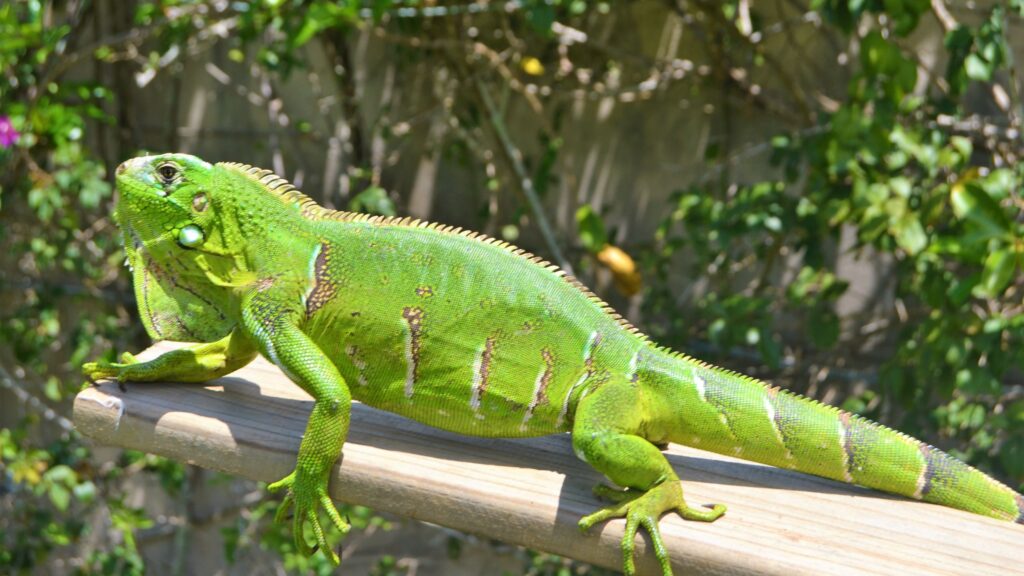Introduction
It’s not often that you get to write about iguana poop, but here we are. Encountering iguana poop in your yard or property can be alarming, especially if you’re not familiar with its appearance or potential health risks. We’re hoping that you will be able to take away detailed information about iguana poop, from its identification to the associated health hazards and safe handling practices. Understanding these aspects can help you manage and mitigate the impact of iguana droppings effectively.
What Does Iguana Poop Look Like?
One of the first questions people often have is, what does iguana poop look like? Iguana droppings are typically a combination of solid and liquid components. The solid part is dark brown or black, while the liquid part, which contains uric acid, is usually white. This combination can be easily recognized once you know what to look for.
- Appearance: The solid part is pellet-like, similar to small animal droppings, but with a distinctive white cap of uric acid.
- Frequency: Iguanas usually defecate daily or every other day, depending on their diet and health.
For a visual reference, you can view iguana poop pictures online, but always ensure you handle any droppings you find with care.
Health Risks of Iguana Poop
Is iguana poop dangerous? The short answer is yes, it can be. Iguana feces can carry harmful bacteria such as Salmonella, which poses significant health risks to humans and pets. Contact with these bacteria can lead to serious illnesses.
- Salmonella: A common bacterium found in reptile feces, including iguanas. It can cause severe gastrointestinal issues in humans.
- Parasites: Iguana droppings can also contain various parasites that can infect humans and other animals.
How to Handle Iguana Poop Safely
Given the potential health risks, it’s crucial to handle iguana droppings safely. Here are some tips to protect yourself and others:
- Wear Gloves: Always wear disposable gloves when cleaning up iguana feces to avoid direct contact.
- Use Disinfectants: Clean the area thoroughly with a disinfectant to kill any lingering bacteria or parasites.
- Wash Hands: After handling iguana poop, wash your hands thoroughly with soap and water.
For guidelines on handling reptile-associated Salmonella, refer to the CDC’s recommendations.
Iguana Poop and Property Damage
Aside from health risks, iguana poop can also cause property damage. Iguanas often defecate on rooftops, patios, and other surfaces, leading to staining and structural damage over time.
- Staining: The uric acid in iguana droppings can cause unsightly stains on concrete, tiles, and other materials.
- Corrosion: Over time, the acidity of the droppings can corrode roofing materials and other surfaces, leading to costly repairs.
Frequently Asked Questions
Yes, iguana feces can carry bacteria and parasites that may infect pets if ingested or if they come into contact with the droppings.
Clean it up promptly using gloves and disinfectants, and wash your hands thoroughly afterward.
Implementing deterrents such as fencing, netting, and removing attractants like food and water sources can help reduce iguana presence on your property. However, we recommend using Iguana Busters to humanely resolve your invasive iguana problem.
Conclusion
Understanding and managing iguana poop is essential for maintaining a healthy and safe environment. By recognizing what iguana droppings look like, being aware of the associated health risks, and knowing how to handle them safely, you can mitigate the negative impacts on your property and well-being.
For comprehensive iguana removal services and expert advice on managing iguana droppings, contact Iguana Busters. Our team is dedicated to providing safe and humane iguana control solutions, ensuring your property remains clean and safe from the hazards posed by these invasive reptiles.


